In 2020, Florida voters will decide whether to raise the state’s minimum wage, which now sits at $8.46 per hour. The 2020 ballot initiative, Amendment 2, would increase the hourly minimum wage to $10 per hour on September 30, 2021, and subsequently raise wages by $1 annually until it reaches the $15 per hour goal on September 30, 2026.

With the exception of Washington D.C. which has a minimum wage of $14.00 per hour, the average state minimum wage is $8.68 in 2019. The highest minimum wages mandated by law are $12.00 in California, Massachusetts, and Washington. States like California are expected to reach a $15 minimum wage by 2022. However, its gradual move to a $15 wage is starting to have a negative impact in the restaurant industry, which is expected to lose 30,000 jobs from 2017 to 2022. When an artificial price floor is set above the market rate, business owners are faced with tough decisions which generally consist of firing workers or reducing work hours. This is a bad scenario for the low-skilled cohorts in the labor market no matter how you look at it.
However, there must be some empathy displayed in approaching this discussion. It’s not just enough to scoff at the advocates of higher minimum wages. Freedom advocates must offer a solution. These obviously include free-market alternatives. For example, many major cities have incredibly unaffordable housing markets not because of greedy capitalists, but due to restrictive land-use regulations. A more reasonable way of addressing this issue is to advocate for relaxing zoning restrictions, which ultimately lead to more housing units being built at more affordable rates.
On a more controversial note, let’s also talk about easy money. The cost of living increases observed throughout America only show one part of the story. In the background, there is a monetary policy that is largely being ignored. Since the creation of the Federal Reserve in 1913, the U.S. dollar has lost its value by 96 percent thanks to the continuous money-printing operations. We must recognize this one harsh reality about inflation: it’s not about rising prices. Inflation actually refers to increases in the overall money supply. The rising prices are just the consequence of money printing. This is the nature of central banking, which few political pundits or elected officials.
It would also help that we gut the current federal tax system and reduce regulatory burdens for businesses of all sizes. Not only will this allow for businesses to thrive, but workers will reap many benefits as businesses would be able to expand operations and increase productivity, thus resulting in higher wages for American workers.
All of these alternatives have one common thread, however. They don’t involve passing arbitrary laws that tamper with fixed laws of economics. Once people understand that there are market-based options in solving these problems, they will be able to reject the impulse to turn to the state to solve them.

























